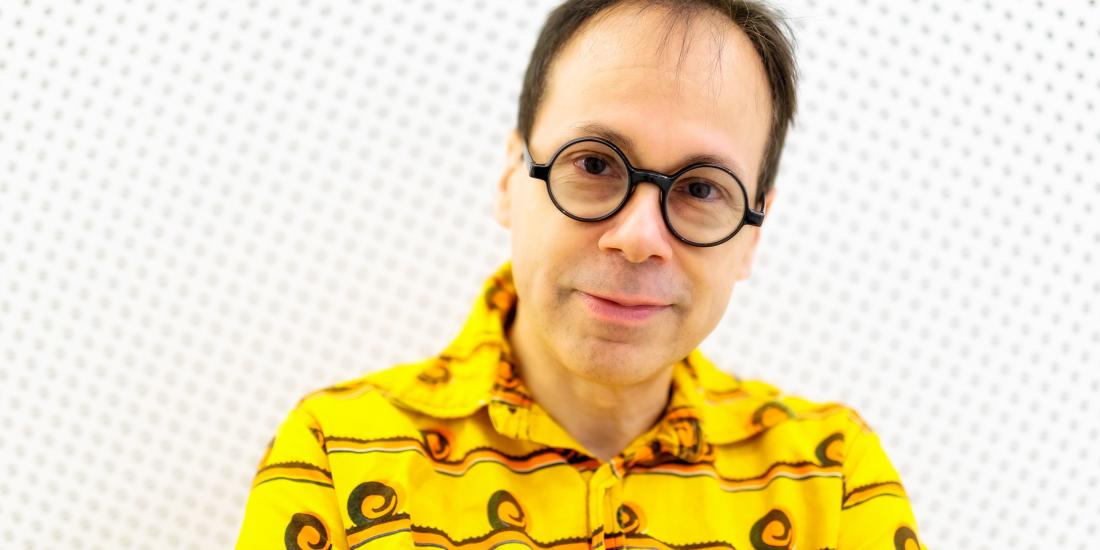You have already written an interesting oeuvre. What exactly characterizes you as a composer?
Well, that's quite a difficult question, because I'm busy with so many different things at the same time. I believe that different artistic questions occupy me and I try to formulate answers to them. In general, I am interested in compositions using improvisation, with or without the use of technology.
I consider myself an outsider, because in the last 50 years most contemporary composers have been busy with timbre as the most important element. Whereby I mean that for example alternative playing techniques in the service of sound and timbre are a big occupation. For me timbre is of course also of major interest, but I prefer to concentrate on parameters like rhythm, harmony and melody.
In another interview you are saying that you wanna 'do things that haven't been done before'. That's also what your father was striving for. Did he influence you to do music professionally?
My father told me that I was very talented for music. When I was two years old, I already played the piano and he noticed that I had a feeling for it, but he always said that it wasn't an obligation to play professionally. It was only after high school, when I was 18 years old, that I really got involved in music. Good to know is that my father was also on the late side, because he was 14. I think he certainly had an influence, but it's hard to measure that. And if not in a musical way, then definitely the attitude he instilled in me.
I have always had a special relationship with my father. I don't consider him a traditional father, but more like a good friend. We used to walk together, talk about music for hours and criticize each other's work. He died 15 years ago now, and I think I wrote my best music after that. I still often think, what would my father think of this?
Do you use innovations from your father in your music?
I never studied with my father, but a few years before I started composing music, my father came into contact with African music. I got interested in it through him, but the work of the Austrian ethnomusicologist Gerhard Kubik also opened my eyes. My father and I use polymetric structures from African music, but we approach them from another perspective. I also have an interest in micro-polyphony, an invention of my father. This technique pops up in my work from time to time. For example, in my Suite for Burkina Electric I make use of micro-glissandi: there are so many glissandi in the dense polyphonic musical fabric that you cannot tell them apart.
Is it sometimes difficult to distinguish yourself as a composer from your father?
At the beginning of my career I wanted to distance myself as much as possible from his world of sound, but I am becoming more aware that this is not necessary at all: we are just two very different composers. I cannot compose like my father and he cannot compose like me. I like the fact that works by both of us are on the programme, and you can be sure that the difference will be very clear. Still, I regret that my music does not always get the attention it deserves.
For your Suite for Burkina Electric you worked with the ensemble Burkina Electric.
A very important part of my compositions are the so-called experimental intercultural projects. By this I mean that I collaborate with musicians of other cultural backgrounds in an equal way, and together we search for new artistic forms of expression that are not typical for each other's origin.
And how does that translate into your composition?
It is very important to know that I compose together with the members of Burkina Electric. This process is very slow, as we all have different ideas, which we have to find a unity in. In addition, only I can write music, so I am responsible for the score. Throughout the suite we explore the possibilities between the ensemble and the orchestra. The orchestral part is completely written out, but Burkina's part contains a lot of improvisation.
You composed for Ars Musica a new movement.
Yes, and because of Covid, this was quite a challenge. I was in Miami and the other musicians were in Burkina Faso. We shared artistic ideas to each other via Whatsapp. It was quite a challenge to put the puzzle together, but I don't think the new movement has become a patchwork. This new movement contains even more freedom than the other parts. We don't know yet how we will play it, but a few weeks before the concert we will get together and discuss the details.
Do you sometimes get criticized for your experimental cultural projects?
I personally haven't yet, but these days there is a lot going on about post-colonial discourse and there are people who claim that classical music is racist. I completely reject this kind of thinking, because I think that thinking is racist in itself. It makes it impossible for people from different cultural backgrounds to work together, because all you're left with is difference. The cross-cultural work I do is the recognition that we share a world together. We share a human condition, whether we are from Europe or Africa. We share 98% of our concerns. We all fall in love. We all love music. We are all human beings.
What interests me about an experimental cultural project is: how do you bring these worlds together? How do you deal with similarities and differences between groups? In the Suite for Burkina Electro, this manifests itself in conducted versus non-conducted, written versus non-written, partially improvised versus not really improvised, non-electronic versus electronic. These things are not necessarily questions of African versus European, but they are questions of different methods, different ways of working, different ways of learning and different ways of thinking.


